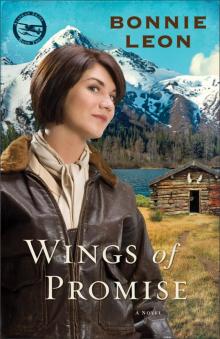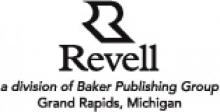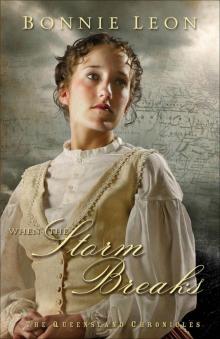- Home
- Bonnie Leon
Joy Takes Flight Page 22
Joy Takes Flight Read online
Page 22
Carolyn stepped into the doorway. “Paul. I’m sorry to disturb you, but some of our guests are leaving . . .”
“I’ll be right there.”
He pushed to his feet and watched Carolyn walk away.
“Will you have time to join me and the wife for a meal before you leave town? Julia’s a fine cook.”
“I’d like that. I’ll see what I can do.”
“Good. I’ll be in touch.”
The two men walked toward the door. Paul’s mind lingered on the what-ifs of living and working in San Francisco. Maybe he should talk to Kate about it.
Attorney Arthur Barkley sat at the head of the dining room table while Paul and his brothers and sisters silently waited for him to begin. He opened a briefcase and took out a packet of papers, adjusted his wire-rimmed glasses, and peered over the top of them at the family. “I was distressed to hear about your mother’s passing. My condolences.”
There was a murmur of appreciation.
“Your mother and I met last on January 21 of this year. She wanted to make some adjustments to the will. The majority is exactly as she and your father agreed upon before his death.”
He cleared his throat and read through the designations made to the Anderson children. There were specific items listed for individuals. Paul was the recipient of one of his father’s rifles. The business and financial assets were equally distributed among the siblings, leaving them all well-off.
There was one unexpected announcement—the house. Esther Anderson had made her wishes clear. The house was to go to Paul.
“She asked me to convey to you that she’d rather the house not be sold,” Mr. Barkley said. “It was her wish that you live here. However, if that is not to your liking, it can be given to one of the other children. And if no one wishes to live in the home, it can be put up for sale along with its contents. The proceeds are then to be evenly distributed among you.”
Silence descended over the room. Mr. Barkley placed the papers inside his briefcase and closed it. “I’ll make sure that you each receive a copy of the will.” He stood. “If you choose to sell the house, I’ll be happy to assist and will oversee the distribution of funds.”
“Thank you,” Robert said, and walked Mr. Barkley to the door. When he returned to the dining room, no one said a word. Silence felt like a heavy shroud.
It was Audrey who spoke first. She pressed fingers to a fevered brow. “I’m glad she gave the house to you, Paul.”
“But you’ve been living here.” Paul didn’t know what to say. Why would his mother have given it to him?
“I have, but Mother knew that I intend to move into an apartment of my own. My job at the paper provides ample income. And now with my inheritance I’ll have no difficulty whatsoever.”
“I don’t plan to live here,” Paul finally managed to say. “Kate and I have a home in Alaska and responsibilities to the people there.”
Carolyn looked at her husband, Charles. “This is a lovely house, but I’d much prefer to remain where we are. The children are settled there.”
Charles patted her hand. “I agree.”
“And the same goes for me and Mary,” Robert said, placing an arm around his wife.
“I love our home,” Mary said. “It has the loveliest view of the bay.” She folded her hands in front of her on the table, her lips compressed.
Paul turned to Sean.
“Don’t look at me. I don’t want the thing. I’ve got my own house, and I can’t be bothered to look after this place. It’s too big for just me.”
All eyes moved back to Paul.
Audrey spoke. “Mother wanted you to have it. You must stay.” She coughed and pulled a handkerchief out of her dress sleeve to cover her mouth. “You’re the practical choice. We all know how much she longed for your return.”
“I can’t stay here.” Paul felt guilt work its way through his insides. “Audrey, I think you should remain here. After all, it’s home to you.”
She shook her head no, then pressed a hand to her temples and rubbed them.
“Are you all right, Audrey?” Carolyn asked.
“Yes. But I have the most horrid headache and a sore throat.”
Paul studied her. She didn’t look at all well, and if the high color in her cheeks were any indication, she had a fever. “Maybe you should lie down.”
“No. I’ll be fine.” She sat straighter in her chair.
Carolyn’s husband, Charles, spoke up. “I wasn’t born into this family, but Esther always made me feel as if I were. There’s been what feels like a chasm here since you left, Paul. I’m thinking that your mother understood that this house needs you.” He hurried on before Paul could speak. “It would be idyllic, close to the hospital. And since you and Kate have only just started your lives together, I expect there will be children. This place offers ample room for a growing family.”
Audrey pressed her perfectly manicured hands together. “I think it’s an ideal solution. It would be fabulous to have you and Kate close by. We’d be a family again. And I’d love to become better acquainted with her. She sounds absolutely fascinating.” Audrey leaned forward. “I could write a story about her piloting adventures for the paper.”
Paul looked at the faces around the table. He felt cornered and confused. “I have a life in Alaska, good friends, and my medical practice.”
“You call flying into villages a practice?” Audrey challenged.
“I don’t suppose you’d see it that way, but I’m needed. And to a pilot, there’s nothing to match flying in Alaska.” Paul knew Kate loved the challenge of the north, but he also wondered if she could be happy here in San Francisco. There would certainly be a need for good pilots. And here, she would be safer.
- 20 -
A loud popping sound startled Kate awake. It was still dark, but she left the warmth of her bed and gazed out of the window. She couldn’t see anything except ice fog. She decided that what she’d heard was the sound of a tree branch breaking under the weight of ice that had built up. Chilled, she returned to bed, pulled the blankets up under her chin, and snuggled down, hoping for more sleep. No such luck—her mind was awake.
She wondered what time it was and tried to read the clock. With a sigh, she turned on the bedstead lamp, squinting against the brightness of the light. It was 6:45, too early to get up and too late to go back to sleep. She dropped onto her back and rested her arms over her face.
Paul had left a message at the airfield the night before, and Kate had intended to call him when she got to the house. However, after building a fire, feeding Angel, making herself a meal, and then falling asleep on the sofa, it was too late to call.
She’d gone to bed frustrated with herself and hadn’t dropped off to sleep until after midnight. She needed to call him. Throwing off her covers, she dropped her feet to the floor and hurried across the cold floorboards to the bathroom. Still half asleep, she stared into the mirror, wishing she could call, but knowing it was too early. She splashed her face with water and felt more awake.
Returning to the bedroom, she took another glance out the window. Fog swirled in the outdoor light of a neighbor’s house. Ice clung to a cottonwood tree like ivy hugging a rock hedge. She wondered how cold it was. Below zero for sure. She pushed her feet into slippers and pulled on a bathrobe. Coffee. She needed coffee.
Kate flicked on the front room light. Angel nuzzled her hand, then trotted to the front door.
“Stay close,” Kate said, letting her outside, quickly closing the door against the frigid air.
Her arms prickled from the cold as she shuffled to the kitchen stove. She crumpled newspaper and shoved it into the firebox, added kindling, and then lit the paper. A tiny flame licked at the newsprint and flared to life. Flames traveled along the edges of the kindling and smoke curled up into the room. Kate placed chunks of wood in the fire, and then closed the firebox lid, her mind on Paul. Why had he called?
Accompanied by the crackling and popping sound of burnin
g wood, Kate made coffee and set it on the stove, then built a fire in the parlor. She wished there were some way to coax more heat from the stove faster. Lifting a quilt off the sofa, she draped it around her shoulders and pulled it closed in front.
A whine came from the other side of the front door. “Oh, poor Angel. I forgot you.” She hurried to the door and opened it. The dog pushed her way inside and Kate gave her cold coat a good rub, shivering as she did. “I’m sorry, girl.”
With the quilt snugged around her, Kate sat in a rocker near the parlor stove. Paul’s mother’s funeral had been two days ago. She’d hoped for a call from him that day, but it hadn’t come. Most likely he’d been busy with all the tasks that went along with a funeral. Still, she’d made sure to stay by the phone that day, but he didn’t call before she had to leave. She glanced at the mantle clock. Seven thirty was still too early to call.
The aroma of percolating coffee made the house feel warmer. Kate closed her eyes and dozed. When she awakened, her eyes went directly to the clock. Only ten minutes had passed. She willed the hands to move more quickly. She had a mail run today. If she didn’t get ahold of Paul before she left, she’d have to wait the entire day before she could try again.
Deciding she might as well eat, Kate removed the quilt and laid it over the sofa, then went to the kitchen to prepare breakfast. While she worked, she watched the clock. She’d wait until eight o’clock.
The coffee was ready, so she poured a cup, then flipped her French toast. Sipping her coffee, she waited, then took a peek at the underside of the toast—still not ready. She glanced at the clock. Only fifteen minutes had passed. What if Paul had called to tell her when he was coming home? Without warning, tears surfaced. She blinked them back and checked the toast again, but couldn’t see through the blur of tears. She swiped them away and, deciding she didn’t care how cooked the toast was, she slid it onto a dish and moved the skillet off the heat. After setting her food and coffee on the table, she returned to the kitchen for silverware, butter, and syrup.
Kate sat and gazed around the house. It was empty. She was alone. There was no Paul and no baby. She took an unsteady breath. What if there were no more babies? She pressed a hand to her flat stomach. She would have been only weeks away from delivery.
Kate forced her attention back to her meal and, forgoing the butter, drizzled syrup over the French toast. She took a bite and chewed, but could barely swallow past the tightness in her throat. Stop thinking about it. There’s nothing that can be done.
She leaned back in her chair and took a couple of deep breaths, then lifting her cup, she sipped her coffee and turned her thoughts to a safer issue—Lily and Clint. They were sweet on each other. She wondered if they’d get married. She hoped so. They were perfect for each other and Clint would be an excellent father to Teddy.
She finished her meal and glanced at the clock—7:55. She’d wait. Kate set the dishes in the sink and rinsed them. It was time. She went to the telephone, and after giving Paul’s number to the operator, she listened for his voice on the other end. Finally she heard, “I have your party. One moment please.”
“Hello.” It was Paul. “Kate?” He sounded tired.
“Yes. It’s me. How are you?”
“I’m fine, just missing you.”
Kate smiled. His words warmed the worry in her heart. “I miss you too. I would have called yesterday, but by the time I got home it was too late. You sound worn-out.”
“I’m all right. I’ve had some long nights and there’s been a lot going on here. How are you? I’ve been worried about you.”
“I’m fine,” Kate said, then knowing Paul would need more convincing, she added, “Really.” She tried to sound cheerful. “Do you know when you’ll be home?” There was a long pause on the other end of the line. Kate’s heart thumped with anxiety. “Paul?”
Finally, he said, “I don’t know yet.”
“Oh. How was the service?”
“It was nice. Mother had a lot of friends and I think every one of them attended. I couldn’t call until yesterday, but you weren’t home.”
“I’m sorry. I was on a run. I think about you all the time. Is your family well?”
“Yes, all except Audrey. She has influenza. There’s an outbreak of it here.”
“Oh dear. Is she all right?”
“She’s pretty sick. And all of a sudden I’m the best doctor in the city. She won’t deal with anyone but me. I’m keeping an eye on her.”
“And you, how are you?”
“I’m okay. Tired. But I’m glad the funeral is over. Mother was ready to go . . . it’s difficult. But Mother and I had some good conversations, and I’m rebuilding relationships with my family. I’m glad I came.”
“Then I’m glad too. But I’m so sad about your mother.” She’d thought about what it would be like to lose her mother and couldn’t imagine life without her.
“And about coming home . . . well, there’s a lot that needs to be done here before I can leave.” He sounded like he was trying to be matter-of-fact.
Kate’s heart sank. “Oh? What kind of things?”
“The attorney who’s handling Mother’s affairs met with the family yesterday. Mother gave her house to me. She doesn’t want it sold. I’ve tried to convince Audrey to stay, but she refuses.” His voice sounded hesitant. “I’m praying about it.”
Alarm burst through Kate. “Are you thinking of living there?”
“No. Of course not. We have a house . . . well, a cabin. And we have the place in Anchorage too.”
“And neither one them is anywhere nearly as nice as your mother’s home.”
“It is nice and has a certain charm, but so does our cabin. Though I must admit the two places couldn’t be more different.” He chuckled. “If Audrey won’t live at Mother’s, we’ll have to get it ready for sale.”
Kate’s heart sank. She needed Paul. “Of course. What about Christmas? It’s our first together.”
“I was thinking you could come down. We’d spend the holidays here in San Francisco. You’d be able to meet my family and we’d be together.”
Kate had imagined their first Christmas would be spent on the creek with their friends, not in a big city where she’d be among strangers. She hated the idea. “Is it possible for you to be home before Christmas?”
“If you can’t come down, I’ll fly up.”
Kate felt relief and then guilt over her selfishness. “That’s a lot of air travel for this time of year. It can be treacherous. I’d rather you stayed than put yourself at risk.”
“I wish you’d consider taking a steamer down. I’d love you to meet my family and see my home.”
Home? This is your home. “I’ll think about it.” Kate couldn’t dredge up any enthusiasm.
“Another thing,” Paul said. “I was asked by an old colleague of mine, Walter Henley, to return to work at the hospital and to join him in his private practice. I told him no, but with the outbreak of influenza I feel obligated to help, at least for a few weeks. The hospital and Walter are both short-staffed. And the hospital doesn’t have room for all the patients. Walter said there were people sleeping on cots in the hallways.”
Kate’s stomach dropped. He was being sucked back into his old life. “That sounds horrible.”
“It is. Will you be all right if I stay? Just until things settle down here.”
And when will that be? Kate seethed. “It’s up to you, not me,” she said, biting off her words.
“I’ll think about it and let you know.” A long pause hung between them. “Well, I better go. This call is going to cost a pretty penny.”
“Okay.” Kate didn’t want to say good-bye.
“I love you.”
“I love you too.”
“And what about Christmas? Will you come down?”
“Of course,” Kate said, but she couldn’t imagine it. “I’ll see about making arrangements.”
“I can hardly wait! There’s so much I want to show you
. Have you ever been to San Francisco?”
“No.” Kate felt depressed.
“All the more fun, then. Bye, Katie.”
“Bye.” Kate hung the speaker in its cradle and sank into a chair. Paul wasn’t coming back.
- 21 -
When Donald first went to work at the airfield, he took the easiest runs. He was friendly and laid-back—Kate liked him. He didn’t look anything like Mike, but he approached life the same way Mike had, as if each day was just another adventure. Sometimes he could be overconfident, which worried Kate. Too much confidence could get a pilot into trouble.
Kate heard the sound of a plane approaching the field and looked out the window just in time to see Donald’s Fairchild come in. The rear end whipped to one side and he lost control and headed toward the hangar bay. “No!”
Jack leaped to his feet. “What?” He swung open the door. “He’s going to hit the hangar!” Jack let loose a string of profanity as he ran toward the field and watched Donald clip the side of the building and then roll to a stop. He stormed across the field toward the plane.
Kate hurried after him.
When Donald climbed out of his plane, Jack laid into him. “What in tarnation do you think you’re doing?”
“I got hit by a crosswind and—”
“The winds aren’t bad. In all my years I’ve never seen a pilot lose control over a little bit of wind like we got today.”
“It came out of nowhere.”
“You’re fired. I knew you weren’t ready for this job. Now, take your plane and get off my field!”
Donald’s mouth dropped open. “But—”
“Git!” Jack headed toward the hangar. “And you’ll pay for the damage to my building.”
Kate followed Jack. “Hey, Jack. Give him another chance.” She glanced back at Donald. “Everyone makes a mistake now and then. And sometimes the winds can gust pretty hard through here.”
Jack stopped and glared at her. “And why should I give him a break? Novices cost me money—they’re either too afraid to take a full load just in case they can’t make a clean takeoff or they overload and end up in the drink somewhere. Today he nearly cost me a hangar.”

 Wings of Promise
Wings of Promise Touching the Clouds
Touching the Clouds Joy Takes Flight
Joy Takes Flight Enduring Love
Enduring Love The Heart of Thornton Creek
The Heart of Thornton Creek Worthy of Riches
Worthy of Riches For the Love of the Land
For the Love of the Land To Love Anew
To Love Anew Longings of the Heart
Longings of the Heart When the Storm Breaks
When the Storm Breaks